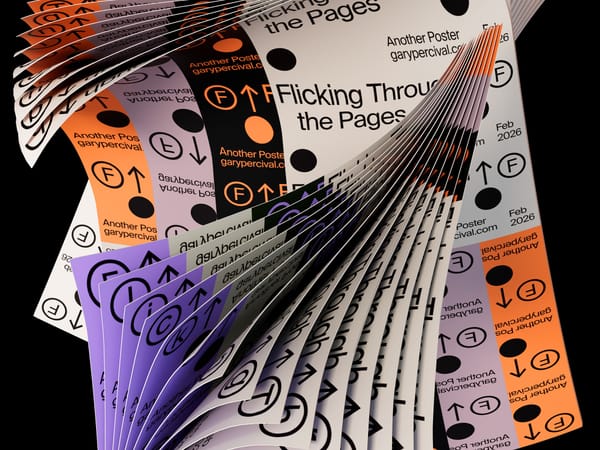The Power Question Every Creative Should Ask: 'Who Can Help Me?'
By asking, "Who can help me?" we open ourselves up to building meaningful relationships with others who can provide guidance, encouragement, and a listening ear when we need it most.

The Power Question Every Creative Should Ask: 'Who Can Help Me?'
As freelancers, graphic designers, and creatives, we frequently find ourselves navigating our industry's complex landscape alone. We pour our hearts into our work, striving to create unique and impactful designs that resonate with our clients and audiences.
However, in the pursuit of excellence and the pressure to succeed, we sometimes forget the most powerful question we should be asking ourselves: "Who can help me?"
In this post, we'll explore the transformative power of seeking help and collaboration in our creative journeys. We'll discuss why asking for help is a sign of strength, not weakness, and how building a network of support can elevate our work, expand our opportunities, and foster personal and professional growth.
The Myth of the Solo Creative Genius
The romanticised notion of the solo creative genius, toiling away in isolation, is a pervasive myth in our industry. We often buy into the idea that true creativity springs from within and that seeking help is a sign of inadequacy or a lack of talent.
However, this couldn't be further from the truth.
In reality, the most successful and impactful creatives are those who understand the value of collaboration, mentorship, and support.
They recognise that creativity thrives in an environment of shared ideas, diverse perspectives, and collective wisdom.
By asking, "Who can help me?" we open ourselves up to a world of possibilities and tap into the vast potential of our creative community.
The Benefits of Seeking Help
1. Expanding Your Skill Set:
As creatives, we're constantly striving to improve our craft and stay ahead of the curve. However, there's only so much we can learn on our own. By seeking help from others who have expertise in areas we're less familiar with, we can expand our skill set and become more well-rounded professionals.
Whether it's learning new design software, mastering a specific technique, or gaining insights into a particular industry, seeking help from those who have been there before can accelerate our growth and enhance the quality of our work.
2. Gaining Fresh Perspectives:
When we work in isolation, it's easy to get stuck in our own creative echo chambers. We may become attached to certain ideas or approaches, limiting our ability to see new possibilities or alternative solutions. By seeking help and collaboration from others, we expose ourselves to fresh perspectives and ideas that can challenge our assumptions and spark new avenues of creativity.
“Collaboration isn’t just a tool; it’s a catalyst that transforms individual creativity into collective brilliance.”
Collaborating with professionals from different backgrounds, industries, or even cultures can broaden our horizons and infuse our work with new energy and insights. It allows us to see our projects through new lenses and consider approaches we may have never thought of on our own.
3. Building a Support Network:
The creative journey can be a rollercoaster of highs and lows. There will be moments of triumph and success, but also times of self-doubt, rejection, and setbacks. Having a strong support network of mentors, colleagues, and friends who understand the unique challenges of our industry can make all the difference.
By asking, "Who can help me?" we open ourselves up to building meaningful relationships with others who can provide guidance, encouragement, and a listening ear when we need it most.
These connections can be invaluable sources of support, both personally and professionally, as we navigate the ups and downs of our creative careers.
4. Accessing New Opportunities:
In the competitive world of freelancing and design, opportunities often arise through connections and referrals. By actively seeking help and collaboration from others, we expand our network and increase our visibility within the industry.
When we ask, "Who can help me?" we may discover new clients, projects, or partnerships that we would have never encountered on our own. Our collaborators and mentors can become advocates for our work, opening doors and connecting us with opportunities that align with our skills and passions.
5. Fostering Personal and Professional Growth:
Asking for help is not a sign of weakness; it's a sign of strength and a commitment to personal and professional growth. When we embrace the idea that we don't have to have all the answers and that there's always room for improvement, we create a mindset of continuous learning and development.
We challenge ourselves to step outside of our comfort zones, explore new ideas, and push the boundaries of our creativity by seeking help and collaboration. We become more adaptable, resilient, and confident in our abilities to tackle new challenges and grow as professionals.
6. Giving Back and Paying It Forward:
As we build our network of support and collaboration, it's important to recognise the importance of reciprocity and giving back to the creative community. Once we have benefited from the guidance and assistance of others, we should strive to pay it forward by offering our own time, expertise, and mentorship to those who are just starting out or facing challenges of their own.
By embracing a mindset of generosity and knowledge-sharing, we not only contribute to the growth and success of our peers, but we also reinforce the values of collaboration and mutual support that are essential to the health and vibrancy of our industry.
How to Ask for Help:
1. Identify Your Needs:
Before reaching out for help, take the time to clarify what specific assistance or collaboration you're seeking. Are you looking for technical advice on a particular piece of software? Do you need feedback on a design concept? Are you seeking mentorship or guidance in a specific area of your career?
Being clear about your needs will help you identify the right people to reach out to and communicate your request effectively.
2. Leverage Your Network:
Start by looking within your existing network of colleagues, mentors, and industry connections. Reach out to those who have expertise in the areas you need help with or who have expressed a willingness to collaborate or offer guidance.
Don't be afraid to ask for introductions or referrals if someone in your network knows someone else who could be a valuable resource. Remember, most people are happy to help when asked and appreciate the opportunity to share their knowledge and insights.
3. Join Creative Communities:
Engage with online and offline creative communities where you can connect with like-minded professionals, share ideas, and seek advice. Participate in forums, social media groups, or attend industry events and workshops where you can network and build relationships with potential collaborators and mentors.
These communities can be invaluable resources for finding help, inspiration, and support throughout your creative journey.
4. Be Specific and Respectful:
When reaching out for help, be specific about what you're asking for and respectful of the other person's time and expertise. Provide context about your project or challenge, and be clear about what kind of assistance you're seeking.
Show appreciation for their willingness to help and be open to their feedback and suggestions. Remember that helping others is a two-way street, so be ready to offer your own insights and support when the opportunity arises.
5. Embrace Vulnerability:
Asking for help requires vulnerability and the willingness to admit that we don't have all the answers. It can be intimidating to reach out and expose our challenges or areas for improvement, but it's essential for growth and success.
Embrace vulnerability as a strength, and remember that everyone, even the most successful creatives, needs help and collaboration at times. By being open and authentic in our requests for help, we create opportunities for genuine connection and support.
Conclusion
In the world of freelancing, graphic design, and creative work, it's easy to fall into the trap of thinking we have to go it alone. However, by asking the powerful question, "Who can help me?" we open ourselves up to a world of possibilities and support.
Seeking help and collaboration is not a sign of weakness but a sign of strength and a commitment to personal and professional growth.
By building a network of mentors, colleagues, and collaborators, we expand our skills, gain fresh perspectives, access new opportunities, and foster a mindset of continuous learning and development.
So, the next time you find yourself facing a creative challenge or feeling stuck, remember to ask yourself, "Who can help me?" Reach out, make relationships, and believe in the power of working together and getting help to change things. Together, we can elevate our work, our industry, and our creative journeys to new heights.



